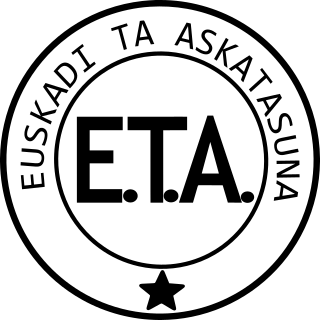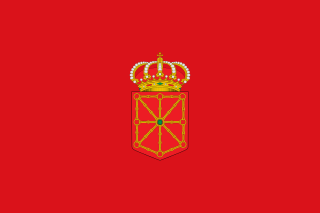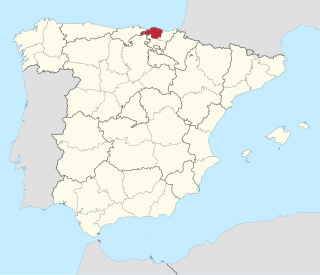
Basque is the only surviving Paleo-European language spoken in Europe, predating the arrival of speakers of the Indo-European languages that dominate the continent today. Basque is spoken by the Basques and other residents of the Basque Country, a region that straddles the westernmost Pyrenees in adjacent parts of northern Spain and southwestern France. Basque is classified as a language isolate. The Basques are indigenous to and primarily inhabit the Basque Country. The Basque language is spoken by 806,000 Basques in all territories. Of these, 93.7% (756,000) are in the Spanish area of the Basque Country and the remaining 6.3% (50,000) are in the French portion. Basque is considered the most spoken language isolate in the world.
The Basques are a Southwestern European ethnic group, characterised by the Basque language, a common culture and shared genetic ancestry to the ancient Vascones and Aquitanians. Basques are indigenous to, and primarily inhabit, an area traditionally known as the Basque Country —a region that is located around the western end of the Pyrenees on the coast of the Bay of Biscay and straddles parts of north-central Spain and south-western France.

ETA, an acronym for Euskadi Ta Askatasuna, was an armed Basque nationalist and far-left separatist organization in the Basque Country between 1959 and 2018, with its goal being independence for the region. The group was founded in 1959 during the era of Francoist Spain, and later evolved from a pacifist group promoting traditional Basque culture to a violent paramilitary group. It engaged in a campaign of bombings, assassinations, and kidnappings throughout Spain and especially the Southern Basque Country against the regime, which was highly centralised and hostile to the expression of non-Castilian minority identities. ETA was the main group within the Basque National Liberation Movement and was the most important Basque participant in the Basque conflict.

In Spain, an autonomous community is the first sub-national level of political and administrative division, created in accordance with the Spanish Constitution of 1978, with the aim of guaranteeing limited autonomy of the nationalities and regions that make up Spain.

Navarre, officially the Chartered Community of Navarre, is a landlocked foral autonomous community and province in northern Spain, bordering the Basque Autonomous Community, La Rioja, and Aragon in Spain and Nouvelle-Aquitaine in France. The capital city is Pamplona. The present-day province makes up the majority of the territory of the medieval Kingdom of Navarre, a long-standing Pyrenean kingdom that occupied lands on both sides of the western Pyrenees, with its northernmost part, Lower Navarre, located in the southwest corner of France.

Biscay is a province of Spain and a historical territory of the Vascongadas, heir of the ancient Lordship of Biscay, lying on the south shore of the eponymous bay. The capital and largest city is Bilbao.

Basque nationalism is a form of nationalism that asserts that Basques, an ethnic group indigenous to the western Pyrenees, are a nation and promotes the political unity of the Basques, today scattered between Spain and France. Since its inception in the late 19th century, Basque nationalism has included Basque independence movements.

The Basque Nationalist Party, officially Basque National Party in English, is a Basque nationalist and regionalist political party. The party is located in the centre of the political spectrum.

The Basque Country is the name given to the home of the Basque people. The Basque Country is located in the western Pyrenees, straddling the border between France and Spain on the coast of the Bay of Biscay.

Elorrio is a town and a municipality located in the eastern part of the province of Biscay, in the Basque Country, in northern Spain. As of 2017, it has a population of 7,307 inhabitants. It covers an area of 37.20 square kilometers and it has a population density of 193.58 people per square kilometer. It holds the medieval title of Most Loyal and Noble Villa.

Pablo Uranga Díaz de Arcaya was a Spanish painter of Basque ancestry; known mostly for portraits and genre scenes. He was also one of the founders of the Association of Basque Artists.

The War in the North was a theatre of the Spanish Civil War that occurred in northern Spain from 31 March to 21 October 1937.

San Sebastián, officially known by the bilingual name Donostia / San Sebastián, is a city and municipality located in the Basque Autonomous Community, Spain. It lies on the coast of the Bay of Biscay, 20 km from the France–Spain border. The capital city of the province of Gipuzkoa, the municipality's population is 188,102 as of 2021, with its metropolitan area reaching 436,500 in 2010. Locals call themselves donostiarra (singular), both in Spanish and Basque. It is also a part of Basque Eurocity Bayonne-San Sebastián.

The Basque Country, also called the Basque Autonomous Community, is an autonomous community in northern Spain. It includes the Basque provinces of Álava, Biscay, and Gipuzkoa. It also surrounds an enclave called Treviño, which belongs to the neighboring autonomous community of Castile and León.
Josu Etxaniz Irazabal is a Spanish footballer who plays as a central defender.

The Biscay Campaign was an offensive of the Spanish Civil War which lasted from 31 March to 1 July 1937. 50,000 men of the Eusko Gudarostea met 65,000 men of the insurgent forces. After heavy combats the Nationalist forces with a crushing material superiority managed to occupy the city of Bilbao and the Biscay province.

The Basque Country is a cross-border cultural region that has a distinctive culture including its own language, customs, festivals, and music.
Iñaki Olaortua Descarga is a Spanish footballer who plays as a centre back for Ibiza.
The 1991 Tour of the Basque Country was the 31st edition of the Tour of the Basque Country cycle race and was held from 8 April to 12 April 1991. The race started in Andoain and finished in Elgeta. The race was won by Claudio Chiappucci of the Carrera team.
Egin kantu! was a television program, a musical talent show, aired on EITB network from 2006 to 2010 and presented by Nerea Alias. A music talent contest with viewer voting and reality show elements, which aimed to find the country's next singing sensation.
















